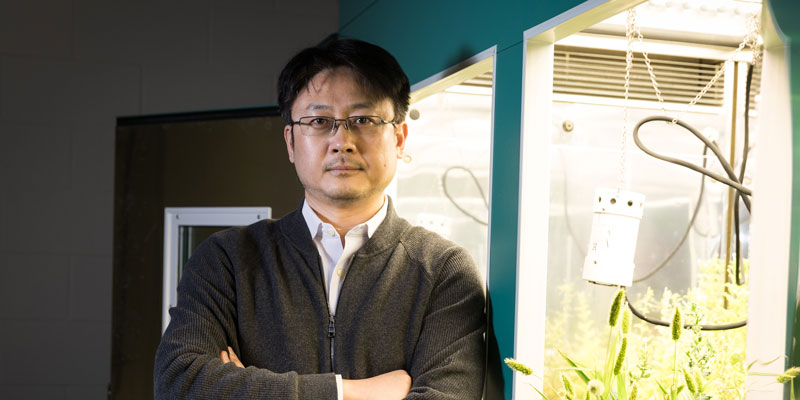
Feng Zhang was born and raised in Zhengzhou, the capital of Henan Province, China’s most populous province. Both math and science came easily to him, so he set his academic sights on genetics, a natural marriage of two passions that would allow him to “solve real problems in the real world.”
Zhang earned a B.S. degree in molecular biology and a Master’s in genetics at Nankai University before coming to the U.S. in 1999. As a Ph.D. student at Iowa State University, his research focused on transposable elements of corn, something he also studied as a post-doc at the University of Georgia.
It was Barbara McClintock’s research and remarkable story that triggered Zhang’s interest in transposable elements. McClintock revolutionized cytogenetics when she discovered transposition or “jumping genes,” challenging and eventually refuting the long-held belief that genes are fixed, immobile entities.
In 2008, Zhang, a post-doctoral researcher, and Dan Voytas a UMN professor with Genetics, Cell Biology and Development, had a breakthrough in gene-editing that pushed past the low-efficacy limitations of more conventional techniques. Using their groundbreaking system, TALEN® (transcription activator-like effector nucleases) can insert, delete and replace DNA sequences in a targeted and precise manner, harnessing and controlling genetic traits.
The duo formed Calyxt in 2010, a U of M biotech start-up that uses genetic engineering to develop more nutritious, resilient crops. During the seven years Zhang was with the New Brighton-based company, he and Voytas put TALEN® to the test: Among their successes is a soybean that produces high-oleic, trans-fat-free oil and high-fiber, mold-resistant wheat. When Calyxt went public last year, the founder and COO took the opportunity to return to academia. He joined the U’s Department of Plant and Microbial Biology in January as an assistant professor. Zhang is also a member of the Center for Precision Plant Genomics, a multi-lab body committed to improving genetic-engineering methods and by extension the quality of plants and crop yields.
“At heart, I’m still a scientist,” Zhang said. “I want to keep advancing the [genome-engineering] technology.”
-Ruth Weleczki
INCIDENTALS:
Inspirational source: American geneticist Barbara McClintock studied the genomic structure of maize as a young woman in the 1930s, until her death in 1992. An anomaly in the male-dominated world of science and a pioneer who revolutionized cytogenetics, McClintock discovered transposition or “jumping genes,” casting doubt on the theory that genes are immobile entities, arranged in a fixed, linear position. In fact, McClintock found that sections of maize chromosomes can detach themselves, move and reattach to other chromosomes, subsequently switching genes on and off and altering which traits are expressed and which are not. Her research was met with skepticism and for decades was largely dismissed by her contemporaries. The importance of her work was eventually recognized, and in 1983, 81-year-old McClintock was awarded the Nobel Prize.
Unexpected true facts: “Feng Zhang is a pretty popular name in China. There are more than 100,000 Feng Zhangs in this world, including the CRIPSR inventor at Broad Institute.”
If you were a plant, what would you be? “Corn. It’s tall, resilient, tough, diverse and genetically challenging.”
When he’s not doing science… : Feng is coaching his twin 11-year-old sons’ soccer team and enjoying more relaxing sports like golf. Feng, his wife and sons live in Maple Grove.
Zodiac sign: Aquarius